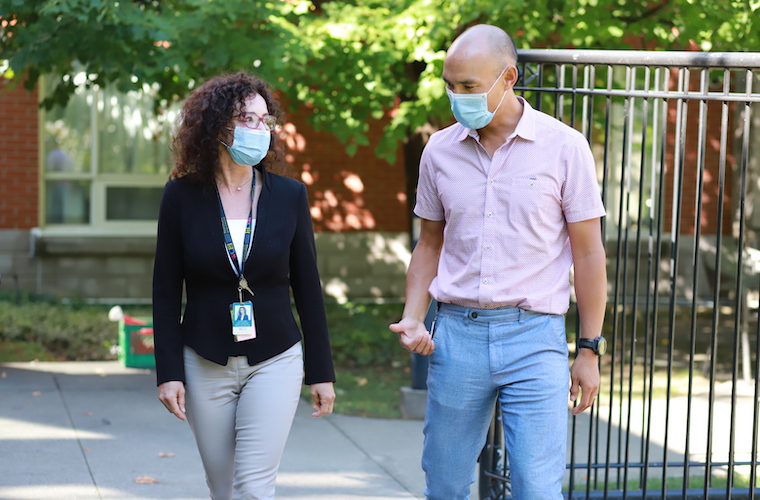Johana Amar, Clinical and Project Manager, Specialized Medicine at Women's College Hospital (left), and John Yip, President and CEO, Kensington Health (right).
In March, as the COVID-19 pandemic tore through long-term care homes across the province, Kensington Gardens leadership had daily check-ins to ensure every possible precaution was being taken to keep the virus out of the 350-bed home.
Excess Personal Protective Equipment (PPE) was ordered, employees received COVID-19 training, all non-essential visitors and employees were barred from coming into the home. Frontline staff coming to work would be screened – as were the residents. Twice a day, actually.
“Still, I knew despite our best efforts the virus was going come in. You can shrink wrap both buildings, and it would find a way,” said John Yip, President and CEO of Kensington Health.
It did. First, one resident tested positive. The other residents on the floor were isolated in their rooms preventing the spread, and thankfully she recovered a few weeks later.
Then, in one day, three residents on a different floor tested positive for COVID-19.
“I knew immediately it was going to be bad. The floor they live on is for cognitively impaired residents, so isolating in their rooms would not be possible. They wander a lot. As other residents on the floor began showing symptoms, we knew we needed to test everyone immediately. I knew exactly who to call.”
John called his colleagues at Women’s College Hospital (WCH), Kensington Health’s partner in the LTC+ Program. The program pairs long-term care homes with hospitals that can provide around-the-clock virtual acute care to avoid having to transfer residents to hospitals.
Within a day, WCH’s mobile COVID-19 assessment team, was at Kensington swabbing every resident and staff member.
“When the results came in, we learned that 22 out of 24 people on that floor had COVID-19. If Women’s College Hospital hadn’t come in as quickly as they did, I think the virus would’ve spread even more. They helped save lives,” said John.
The new partnership with the hospital had already paid off in spades. To help with the outbreak, WCH deployed frontline staff to work alongside The Gardens teams, assisting wherever they were needed, including meal assistance, hygiene and mobility.
It was the first time Kensington had care providers from a hospital work alongside Gardens staff. The teams gelled quickly and began relying on each other to provide life-enhancing care to the vulnerable residents.
“Our collective purpose is to improve the experience and outcome for the clients, patients and individuals we’re serving. Let’s not get hung up on institutional structures that exist that could provide barriers. Let’s imagine the world where that doesn’t matter,” added Heather McPherson, President and CEO of Women’s College Hospital.
“We’ve all got expertise relative to our environment. Kensington’s expertise is in LTC, caring for the most complex individuals in our community. That’s not our expertise. But we can help with occupational health and safety.”
Weeks later, the outbreak was declared over and slowly the redeployed staff returned to their posts at Women’s College Hospital. By working together, the two organizations have proven that where there is trust, communication and agility, we can reimagine care.
“Together, we’re going to innovate care for the elderly. The combination of expertise that Kensington Health and Women’s College Hospital have … we’re in a position to transform what not only working together looks like, but the path forward for care for the elderly,” said Heather.
Kensington Health would like to extend its deepest gratitude to Women’s College Hospital, our LTC+ and hospital resource partner.
